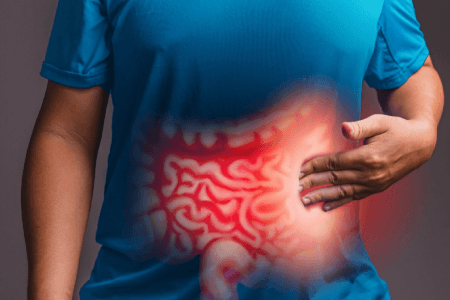Signs & Symptoms

- Early colorectal cancer may not cause any symptoms.
- As the cancer grows, symptoms may include:
- A change in bowel habits, such as diarrhea or constipation
- A feeling that the bowel does not empty completely
- Blood in the stool
- Stomach pain, cramping, or bloating
- Unexplained weight loss
- Fatigue and Anemia
Causes

The exact cause of colorectal cancer is not known, but certain risk factors include
Stages

- The stage of colorectal cancer refers to the extent of the cancer and how far it has spread.
- Stages range from 0 to IV, with 0 indicating that the cancer is confined to the primary site and IV indicating that the cancer has spread to other parts of the body.
Risk Factors
- Age (most cases are diagnosed after age 50)
- Family history of colorectal cancer
- Personal history of colorectal polyps
- Personal history of inflammatory bowel disease
- lifestyle factors such as diet high in red and processed meats, low in fruits and vegetables, obesity, smoking and excessive alcohol consumption
Prevention, Screening & Diagnosis
- Regular screening starting at age 50 (or earlier if there is a family history or other risk factors) is the best way to prevent colorectal cancer by finding and removing polyps before they turn into cancer.
- Screening options include stool-based tests (such as fecal occult blood test, fecal immunochemical test, stool DNA test) or visual exams (such as colonoscopy, sigmoidoscopy).
- Diagnosis is typically done through imaging tests (colonoscopy, CT scan, MRI) and biopsy.
Treatment options
- Surgery (removal of the cancerous tumor and surrounding tissue), radiation therapy, and chemotherapy are the most common treatment options for colorectal cancer.
- The type of treatment recommended will depend on the stage of the cancer, the patient’s overall health and the type of colorectal cancer.
- Our team of specialists at MGM Cancer Institute will work with you to determine the best treatment plan for your individual needs.
Post treatment follow up
- After treatment, patients will be closely monitored to ensure that the cancer has been effectively treated.
- Follow-up appointments may include imaging tests, blood tests, and endoscopy.
- Our team of specialists will also work with you to manage any side effects or complications that may arise during or after treatment.
Call to Action: If you or a loved one has been diagnosed with colorectal cancer and are in need of treatment, we encourage you to learn more about the options available at MGM Cancer Institute. Our team of specialists is dedicated to providing patients with the best possible care and outcomes. Contact us today to schedule a consultation with one of our specialists +91 44 4251 5151 and email us at [email protected] for queries and more details. We understand that a cancer diagnosis can be overwhelming, but with the right treatment and care, we can help you or your loved one fight and overcome this disease.
Tales from
Our Healthcaring Journey
Contact Us
Visiting Hours
OPEN 24 hours 7 days a week.
OPD Timings : Monday to Saturday
( 9:00 AM to 5:30 PM )
Appointments
Emergency
Visit the hospital
MGM Cancer Institute
No 119 & 121, Nelson Manickam Road, Raajeswari Street, Rajaram Mehta Nagar,
Aminjikarai, Chennai – 600029



















